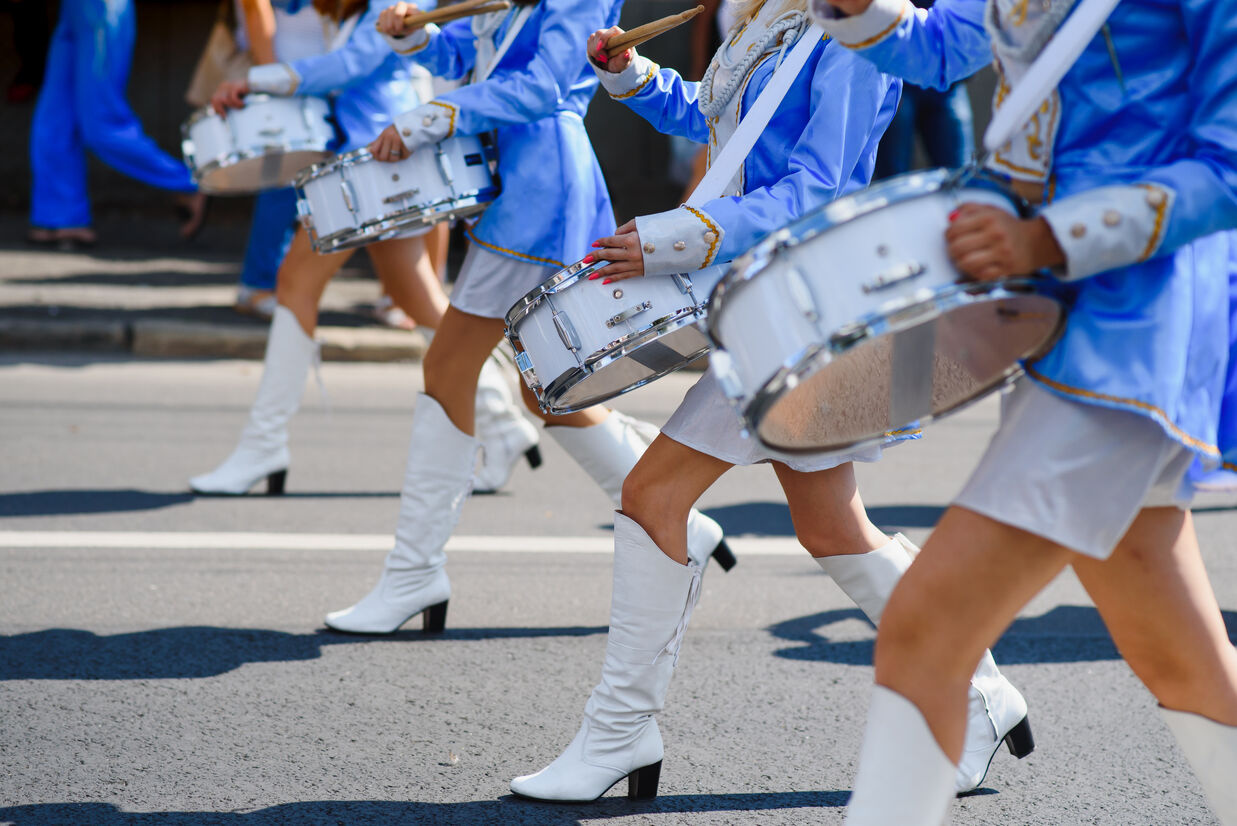
Is Marching Band a Sport?

Matching bands do not cross people’s minds as a sport. At the mention of sports, they often think of basketball, soccer, swimming, and the likes. No one thinks of matching bands.
While some believe it deserves to be called a sport, others see it as musical performing art. Marching band members march in sync, play instruments, and perform during events, but does that make it a sport?
In this blog post, we will take a look at what a sport is, its attributes and whether marching bands fit into those characteristics.
Shall we?
What Is a Sport?
To know whether marching band is a sport or not, we have to understand what a sport is and its characteristics.
- Physical Activity: A sport involves using your body—moving, running, or doing other physical actions.
- Skill: Sport requires special abilities known as skills. You need this to engage in them effectively.
- Competition: In many sports, people compete against others, trying to win.
- Rules: Every sport has rules that players must follow to make the game fair.
Now that we have a clear understanding of what a sport is, let’s see if marching fits into the above characteristics.
Marching Band as a Physical Activity
One of the main things that makes something a sport is the amount of physical activity involved. Marching band may not seem as physically demanding as playing basketball or running a race, but it requires more effort than many people think.
Members of a marching band often spend hours practicing their routines. They must march in sync with the rest of the band while playing their instruments, which requires both coordination and stamina.
In many cases, they are carrying heavy instruments—like tubas, drums, or brass instruments—while marching long distances across football fields or parade routes. Imagine carrying a heavy instrument and walking in time with music without missing a beat!
During performances, marching band members move quickly across the field in carefully planned formations. They have to keep in time with the music, follow the routine, and sometimes even dance or perform other coordinated moves. This requires a lot of focus, energy, and endurance.
So, even though marching band might not seem like the most physically intense activity at first, it’s clear that it involves a lot of physical effort.
Does Marching Band Require Skill?
Marching band is definitely an activity that takes a lot of skill. Not only do members have to learn how to play an instrument, but they also need to know how to march and perform complex formations.
Each member of the band is responsible for memorizing their part in the music and knowing exactly where they need to be on the field at all times. The routines are carefully designed such that the members are coordinated and in sync with the music.
Playing an instrument well requires years of practice. Marching band members must play their instruments while moving, which is much harder than playing while standing still. They also have to keep in rhythm with the rest of the band, paying close attention to the conductor or drum major leading them.
In many ways, the level of skill required for marching band is just as high—if not higher—than some traditional sports. It’s a combination of music and movement that takes years of dedication to master.
Is There Competition in Marching Band?
Many sports involve competition, where teams or individuals compete against each other to win. Marching bands have this element too. There are marching band competitions where different bands perform and are judged on their musical and marching abilities. Bands compete based on how well they play, how precise their marching is, and how entertaining their performance is as a whole.
These competitions can be intense, and bands spend months preparing for them. Judges look at everything from the quality of the music to how well the band stays in formation. Bands are scored on various criteria, and the one with the highest score is declared the winner.
Like other sports, the competition in marching band requires teamwork. The entire band must work together to achieve a perfect performance. Like in soccer or basketball, if one person makes a mistake, it can affect the whole team’s score.
Are There Rules in Marching Band?
Every sport has rules, and marching band is no different. In competitive marching bands, there are strict rules about what bands can and cannot do during performances. There are time limits, restrictions on the size of the band, and guidelines about how performances should be judged.
In addition to the rules of competition, there are also rules that marching band members must follow within their own teams. Everyone has to be in the right place at the right time, and they have to play their part of the music perfectly. There are also rules about how members should behave during practice and performances, ensuring that the team works smoothly together.
The rule in marching band is clear and every member has to adhere for a smooth coordination..
Is There Any Link Between Marching Bands and Sports?
While marching band and traditional sports like football or basketball are different in many ways, they share a lot of similarities. Both require physical fitness, skill, practice, and teamwork. In fact, some might argue that marching is even more difficult in some areas. For example, band members must multitask—playing an instrument while marching in formation—something you don’t usually see in other sports.
Just like in sports, teamwork is a key element in marching band. Each person’s role is important, and if one person misses a step or a note, it can throw off the whole performance. Everyone must work together to create a flawless routine, and that takes a lot of cooperation, trust, and practice.
The Social and Mental Benefits of Marching Band
Sports aren’t just about physical activity. They also offer social and mental benefits, and marching band is no different. Being part of a marching band helps build teamwork, discipline, and a sense of responsibility. Band members form close friendships with each other, just like teammates do in other sports.
Marching bands also require a lot of mental focus. Members must memorize music, routines, and formations, and they have to juggle about multiple things at once during performances. This helps build concentration and mental discipline, just the way athletes need to stay focused during a game.
Is Marching Band a Sport?
Even though marching band shares many similarities with traditional sports, some people still argue that it’s not a sport. One reason for this is that marching band is often seen as an art form, more about entertainment than athletic competition. But, just because something is entertaining doesn’t mean it can’t also be a sport. For example, dancing is entertainment because it is an artistic expression. But can also be considered sports because it encompasses the characteristics of sports. but they are still recognized as sports because they require skill, physical effort, and competition.
Another argument is that marching band doesn’t involve the same level of physical contact or intensity as sports like football or wrestling. However, many accepted sports—like golf, archery, or even chess—don’t involve physical contact but are still considered sports because they require skill, strategy, and competition.
To Wrap It Up
So, can we consider marching band a sport? Going by the definition of a sport and its characteristics, yes. Marching band adopts the same coordination as other sports and requires both physical and mental effort to pull off.
Whether you see marching band as a sport or an art form, one thing is for sure: it takes a lot of dedication, effort, and talent to succeed. Marching band members are just as hardworking and committed as athletes in any other sport, and their performances are a testament to the power of teamwork and practice.
Do you want to find out about other sports? You can join us on Sportcoon now.
Sportconn is a platform that connects athletes, sports professionals, coaches, and enthusiasts like you to achieve your individual goals. People are fast signing up, don’t be left out. Get in now.
